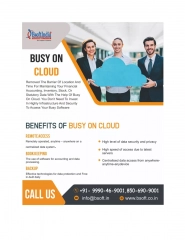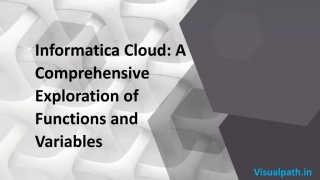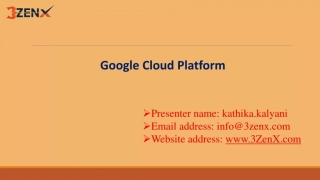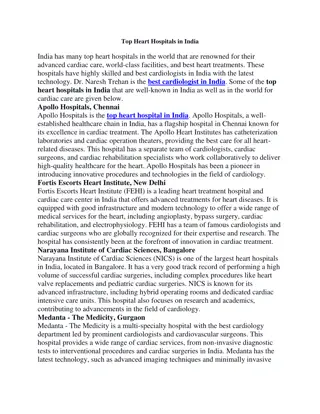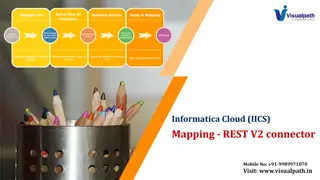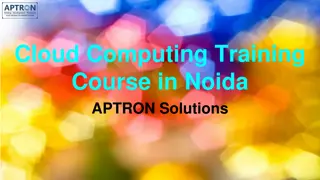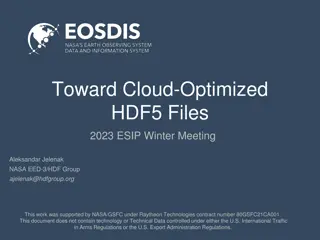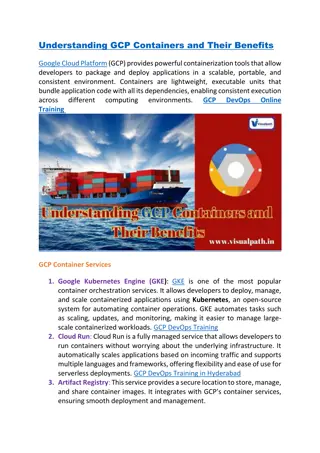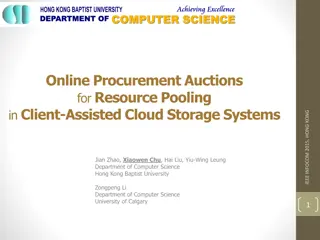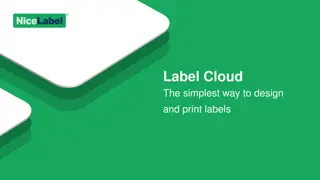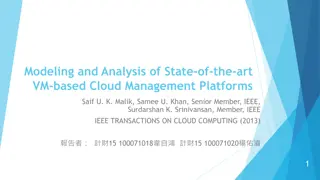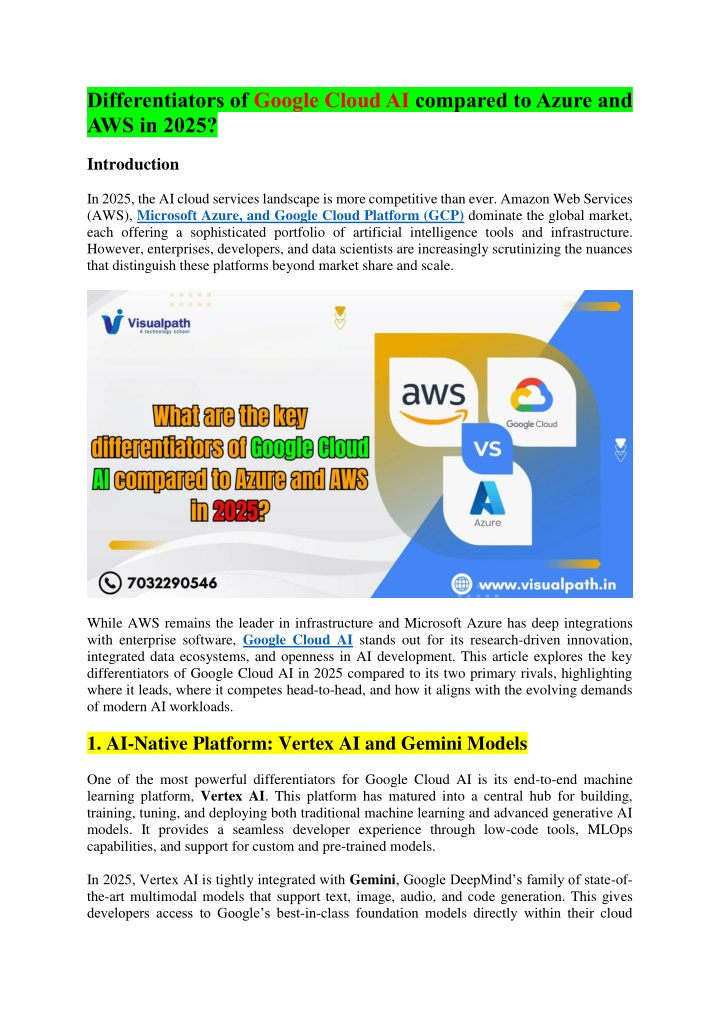
Google Cloud AI Training in India - Google Cloud AI Course Online
Advance your career with VisualPathu2019s GCP AI Online Training, taught by certified professionals. We stand out among Google Cloud AI Training Institutes in Hyderabad for hands-on, career-focused learning. Develop cloud AI expertise and work-ready
Uploaded on | 3 Views
Download Presentation

Please find below an Image/Link to download the presentation.
The content on the website is provided AS IS for your information and personal use only. It may not be sold, licensed, or shared on other websites without obtaining consent from the author. If you encounter any issues during the download, it is possible that the publisher has removed the file from their server.
You are allowed to download the files provided on this website for personal or commercial use, subject to the condition that they are used lawfully. All files are the property of their respective owners.
The content on the website is provided AS IS for your information and personal use only. It may not be sold, licensed, or shared on other websites without obtaining consent from the author.
E N D
Presentation Transcript
Differentiators of Google Cloud AI compared to Azure and AWS in 2025? Introduction In 2025, the AI cloud services landscape is more competitive than ever. Amazon Web Services (AWS), Microsoft Azure, and Google Cloud Platform (GCP) dominate the global market, each offering a sophisticated portfolio of artificial intelligence tools and infrastructure. However, enterprises, developers, and data scientists are increasingly scrutinizing the nuances that distinguish these platforms beyond market share and scale. While AWS remains the leader in infrastructure and Microsoft Azure has deep integrations with enterprise software, Google Cloud AI stands out for its research-driven innovation, integrated data ecosystems, and openness in AI development. This article explores the key differentiators of Google Cloud AI in 2025 compared to its two primary rivals, highlighting where it leads, where it competes head-to-head, and how it aligns with the evolving demands of modern AI workloads. 1. AI-Native Platform: Vertex AI and Gemini Models One of the most powerful differentiators for Google Cloud AI is its end-to-end machine learning platform, Vertex AI. This platform has matured into a central hub for building, training, tuning, and deploying both traditional machine learning and advanced generative AI models. It provides a seamless developer experience through low-code tools, MLOps capabilities, and support for custom and pre-trained models. In 2025, Vertex AI is tightly integrated with Gemini, Google DeepMind s family of state-of- the-art multimodal models that support text, image, audio, and code generation. This gives developers access to Google s best-in-class foundation models directly within their cloud
environmentsomething Azure matches only through OpenAI, and AWS through third-party models in Bedrock. Google Cloud AI Training The advantage lies in natively developed AI models Gemini is built and maintained by Google, offering superior synergy with Google s infrastructure and tools compared to licensed integrations by Azure or AWS. 2. Seamless Integration with BigQuery and Data Ecosystem Google Cloud s data analytics stack remains a core strength, especially in AI-driven use cases. BigQuery, Google s fully managed serverless data warehouse, integrates directly with Vertex AI. This means enterprises can train models on large datasets without data duplication or movement minimizing latency and optimizing costs. In contrast, AWS uses services like SageMaker Studio with Redshift or Athena, while Azure offers Synapse Analytics with ML integration. Both are capable, but Google s data and AI integration is more cohesive and performance-optimized, especially for streaming and real- time analytics. This unified environment is a boon for industries like retail, finance, and healthcare, where data governance, scalability, and speed-to-insight are mission-critical. 3. Custom AI Hardware: TPUs and Edge AI Another major differentiator is Google s custom AI silicon, the Tensor Processing Unit (TPU). In 2025, the fifth generation of TPUs continues to outperform traditional GPUs in many large- scale training and inference scenarios, offering better performance per watt and cost efficiency for specific workloads. Additionally, Google s Coral Edge TPUs enable low-power AI at the edge, serving use cases in manufacturing, smart cities, and autonomous systems. While AWS has Trainium and Inferentia chips and Azure partners with NVIDIA, only Google has developed a vertically integrated hardware-software stack dedicated to AI across cloud and edge environments. This tight coupling of software with hardware offers latency advantages and higher throughput for real-time AI applications. Google Cloud AI Online Training 4. Open Source and Research Leadership Google Cloud s AI ecosystem benefits heavily from its long-standing commitment to open source. TensorFlow, TFX (TensorFlow Extended), JAX, and Kubeflow are all Google- originated projects that form the foundation of many modern AI pipelines. This open philosophy encourages community innovation and minimizes vendor lock-in an increasing concern for enterprise buyers. While Azure has its partnerships with Hugging Face and AWS invests in SageMaker s closed ecosystem, Google s consistent contribution to open AI tooling gives it an edge with developers and researchers alike.
Additionally, Googles AI breakthroughslike AlphaFold, Pathways, and Reinforcement Learning advancements often translate into production-ready tools available first on GCP. 5. Generative AI and Agent Builders In 2025, one of the standout offerings from Google Cloud is the Vertex AI Agent Builder. This low-code platform enables organizations to create custom AI assistants powered by Gemini models and fine-tuned on proprietary data. Unlike AWS Bedrock, which aggregates third-party foundation models, or Azure s reliance on OpenAI s stack, Google s Agent Builder provides deeper customization and enterprise control. It also comes with tools for managing data privacy, compliance, prompt engineering, and retrieval-augmented generation (RAG) out of the box. Enterprises can now rapidly deploy customer service agents, internal knowledge assistants, or intelligent process automation tools without managing complex ML pipelines manually. 6. Multi-Cloud and Hybrid AI with Anthos While all three cloud providers offer hybrid and multi-cloud capabilities, Anthos remains one of the most mature and widely adopted platforms for managing AI workloads across environments. Google Cloud AI Training Anthos allows companies to build once and deploy across GCP, AWS, Azure, or on-premises systems. Combined with Kubernetes, GKE, and service mesh technology, it supports scalable and portable AI pipelines in highly regulated industries. By contrast, AWS promotes hybrid AI through Outposts and Azure through Arc. However, Anthos offers more flexibility and closer integration with AI services like Vertex AI and BigQuery, making it particularly attractive for global enterprises. 7. Cost Management and Sustainability Leadership Google Cloud s AI services are competitively priced and benefit from sustained-use discounts, preemptible resources, and fine-grained billing options that help manage costs effectively especially for high-throughput AI jobs. Additionally, sustainability is becoming a deciding factor in vendor selection. Google has pledged to run its data centers on 24/7 carbon-free energy by 2030, and provides customers with real-time insights into the carbon footprint of their AI workloads. This sets it apart from AWS and Azure, which also have sustainability goals but with less transparency and slower adoption of clean energy monitoring at the user level. 8. Security and Responsible AI Security is table stakes in the cloud, but Google s implementation of zero-trust architecture through BeyondCorp offers enhanced protection for AI workloads. Identity management, access control, and encryption are deeply integrated into the AI pipeline.
Furthermore, Google has published extensive documentation and tools to support responsible AI, including model interpretability, bias detection, and fairness audits. These are crucial as more organizations seek transparency in AI usage, particularly in sectors like finance, healthcare, and government. Google Cloud Platform AI Training Conclusion As organizations increasingly rely on artificial intelligence to drive business transformation, the choice of cloud provider has strategic implications. In 2025, Google Cloud AI distinguishes itself not just through technical excellence, but through a holistic vision of AI as a research-driven, secure, sustainable, and developer-friendly platform. While AWS and Azure each bring significant strengths such as breadth of services and deep enterprise integrations Google Cloud stands out in areas that matter most for next-generation AI: native model innovation, seamless data integration, open ecosystem support, hardware optimization, and rapid deployment tools. For businesses prioritizing AI-led innovation, particularly in data-rich or hybrid environments, Google Cloud AI offers a compelling, future-ready foundation that goes beyond compute and storage toward intelligent, ethical, and efficient decision-making. Trending Courses: Docker and Kubernetes, SAP Ariba, AWS Certified Solutions Architect, Site Reliability Engineering Visualpath is the Best Software Online Training Institute in Hyderabad. Avail is complete worldwide. You will get the best course at an affordable cost. For More Information about Google Cloud AI Contact Call/WhatsApp: +91-7032290546 Visit: https://visualpath.in/online-google-cloud-ai-training.html

